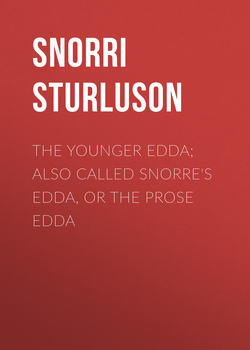The Younger Edda; Also called Snorre's Edda, or The Prose Edda

Реклама. ООО «ЛитРес», ИНН: 7719571260.
Оглавление
Snorri Sturluson. The Younger Edda; Also called Snorre's Edda, or The Prose Edda
PREFACE
INTRODUCTION
FOREWORD
THE FOOLING OF GYLFE
CHAPTER I. GEFJUN’S PLOWING
CHAPTER II. GYLFE’S JOURNEY TO ASGARD
CHAPTER III. OF THE HIGHEST GOD
CHAPTER IV. THE CREATION OF THE WORLD
CHAPTER V. THE CREATION—(CONTINUED.)
CHAPTER VI. THE FIRST WORKS OF THE ASAS. THE GOLDEN AGE
CHAPTER VII. ON THE WONDERFUL THINGS IN HEAVEN
CHAPTER VIII. THE ASAS
CHAPTER IX. LOKE AND HIS OFFSPRING
CHAPTER X. THE GODDESSES (ASYNJES)
CHAPTER XI. THE GIANTESS GERD AND SKIRNER’S JOURNEY.50
CHAPTER XII. LIFE IN VALHAL
CHAPTER XIII. ODIN’S HORSE AND FREY’S SHIP
CHAPTER XIV. THOR’S ADVENTURES
CHAPTER XV. THE DEATH OF BALDER
CHAPTER XVI. RAGNAROK
CHAPTER XVII. REGENERATION
AFTERWORD. TO THE FOOLING OF GYLFE
BRAGE’S TALK
CHAPTER I. ÆGER’S JOURNEY TO ASGARD
CHAPTER II. IDUN AND HER APPLES
CHAPTER III. HOW NJORD GOT SKADE TO WIFE
CHAPTER IV. THE ORIGIN OF POETRY
AFTERWORD TO BRAGE’S TALK
EXTRACTS FROM THE POETICAL DICTION. (SKALDSKAPARMAL.)76. THOR AND HRUNGNER
THOR’S JOURNEY TO GEIRROD’S
IDUN
ÆGER’S FEAST
LOKE’S WAGER WITH THE DWARFS
THE NIFLUNGS AND GJUKUNGS
MENJA AND FENJA
THE GROTTESONG
ROLF KRAKE
HOGNE AND HILD
NOTES
ENEA
HERIKON
THE HISTORICAL ODIN
FORNJOT AND THE SETTLEMENT OF NORWAY
THE FOOLING OF GYLFE. CHAPTER I
CHAPTER II
CHAPTER III
CHAPTER IV
CHAPTER V
CHAPTER VI
CHAPTER VII
CHAPTER VIII
CHAPTER IX
CHAPTER X
CHAPTER XI
CHAPTER XII
CHAPTER XIII
CHAPTER XIV
CHAPTER XV
THE NIFLUNGS AND GJUKUNGS
MENJA AND FENJA
WHY THE SEA IS SALT
VOCABULARY
Отрывок из книги
In the beginning, before the heaven and the earth and the sea were created, the great abyss Ginungagap was without form and void, and the spirit of Fimbultyr moved upon the face of the deep, until the ice-cold rivers, the Elivogs, flowing from Niflheim, came in contact with the dazzling flames from Muspelheim. This was before Chaos.
And Fimbultyr said: Let the melted drops of vapor quicken into life, and the giant Ymer was born in the midst of Ginungagap. He was not a god, but the father of all the race of evil giants. This was Chaos.
.....
Olaf Thordsson, surnamed Hvitaskald,3 to distinguish him from his contemporary, Olaf Svartaskald,4 was a son of Snorre’s brother. Though not as prominent and influential as his uncle, he took an active part in all the troubles of his native island during the first half of the thirteenth century. He visited Norway in 1236, whence he went to Denmark, where he was a guest at the court of King Valdemar, and is said to have enjoyed great esteem. In 1240 we find him again in Norway, where he espoused the cause of King Hakon against Skule. On his return to Iceland he served four years as chief magistrate of the island. His death occurred in the year 1259, and he is numbered among the great skalds of Iceland.
Snorre Sturleson and Olaf Hvitaskald are the two names to whom the authorship of the Younger Edda has generally been attributed, and the work is by many, even to this day, called Snorra Edda—that is, Snorre’s Edda. We do not propose to enter into any elaborate discussion of this complicated subject, but we will state briefly the reasons given by Keyser and others for believing that these men had a hand in preparing the Prose Edda. In the first place, we find that the writer of the grammatical and rhetorical part of the Younger Edda distinctly mentions Snorre as author of Hattatal (the Clavis Metrica), and not only of the poem itself, but also of the treatise in prose. In the second place, the Arne Magnæan parchment manuscript, which dates back to the close of the thirteenth or beginning of the fourteenth century, has the following note prefaced to the Skaldskaparmal. “Here ends that part of the book which Olaf Thordsson put together, and now begins Skaldskaparmal and the Kenningar, according to that which has been found in the lays of the chief skalds, and which Snorre afterward suffered to be brought together.” In the third place, the Upsala manuscript of the Younger Edda, which is known with certainty to have been written in the beginning of the fourteenth century, contains this preface, written with the same hand as the body of the work: “This book hight Edda. Snorre has compiled it in the manner in which it is arranged: first, in regard to the asas and Ymer, then Skaldskaparmal and the denominations of many things, and finally that Hattatal, which Snorre composed about King Hakon and Duke Skule.” In the fourth place, there is a passage in the so-called Annales Breviores, supposed to have been written about the year 1400. The passage relates to the year 1241, and reads thus: “Snorre Sturleson died at Reykholt. He was a wise and very learned man, a great chief and shrewd. He was the first man in this land who brought property into the hands of the king (the king of Norway). He compiled Edda and many other learned historical works and Icelandic sagas. He was murdered at Reykholt by Jarl Gissur’s men.”
.....